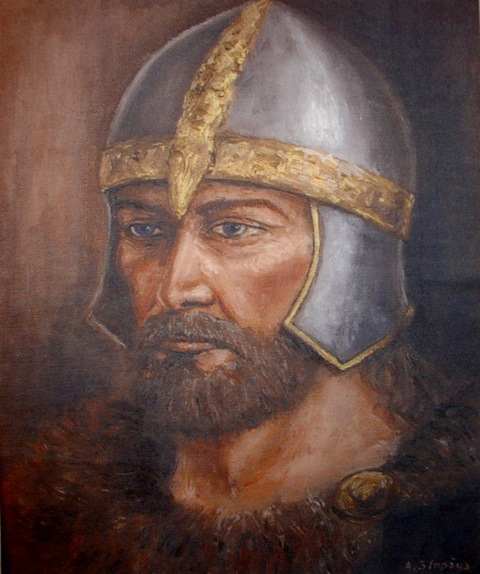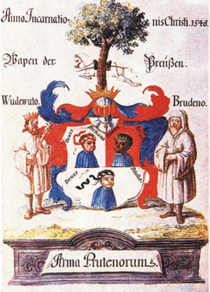
The history of ancient Prusai WHO WERE THE PRUSAI? ARCHEOLOGY COULD PRUSAI BE CHRISTIANS ? Mieszko I Poland THE ARMS AND THE WAY OF FIGHT THE CONQUEST, I, II UPRISING THE III-rd PRUSAI UPRISING The PRUSAI KNIGHTHOOD OPPOSITION What has happened to Prusai? THE GERMANIC ENSLAVEMENTS
The Battle of Grunwald
Culmland Banner The Prusai Maps
PRUSAI
Prusians Heroes Prominent Prusian Where you are, Prusai?
COAT OF ARMS
The Coat of Arms THE COAT OF ARMS PRUS I, II, III Unknown version Prus I,II, III Prus - name and Coat of Arms UNKNOWN COAT OF ARMS EUROPE MONARCHIES
PRUS DESCENDANTS
Pilewski
KURPII
The Kurppii Genesis
THE DISPUTE ABOUT HISTORY
German militarism Tadeusz Mrozinski
CULTURE
About the Prusai language The Prusai language and its sources ART AND PEOPLE Archeology Prusian Babas
PUBLICATIONS
Die Altpreußischen Personennamen Download
Elbling Dictionary
FORUM
FORUM - ARCHIVES
MAIL: PRUS@PRUSOWIE.PL
Counter
Counter

THE PRUS - NAME AND COAT OF ARMS
In Polish name terminology, the name of Prus was little known. The question is where it came from.
I consider this phenomenon to be unusual and very rare, for a different culture, expressed its
identity so forcefully
by using a name describing a people from which it came.
This phenomenon has not up now been subject of a solid study, analysis and comments on this unusual happening and this
possibly on world scale in that after a destroyed and exterminated nation, a commonly used name was left.
In current Poland we can find many well known personalities using the name Prus in sport, business, finance or in
art ie. wokalistka Ewa Prus .
Among the people using this name there are not necessarily any bonds of blood, but with fair amount of certainty there are ethnic bonds.
Another phenomenon is that the coat of arms of Prus occurs in Polish heraldry. In this case heraldry belongs to the field of historical
studies and this has been thoroughly studied. The name of the Prus coat of arms often comes as the first part of a surname.
In both cases this is the ethnic name of a people exterminated in the 13th century. In one case this occurs under the family
name of Prus, in another as the coat of arms call of Prus.
These liaison can only be resolved with the help of science and genetics, which in recent times has made great progress.
The results from genetic research indicate the gaining of knowledge and the unravelling of mysteries of our genetic make up.
In the case of the Prus name and carriers of the Prus coat of arms, in addition to determining family links, genetic research
can throw light on another puzzle. The destruction of the Prusians by the German does not enable us to-day to determine who the
Prusians really were. Whether the individual peoples were blood related, or ethnically different, in spite of the fact that
the language they used was understandable by all. The carrying out of a special project of genetic research code-named Prus
would enlarge current knowledge about Prus genetics. It would also make possible an evaluation as to which Prus region a given
family could be ascribed to.
In Poland we have 6862 persons using the name Prus. Families having the coat of arms of Prus number about 5000.
The largest number of people carrying the Prus name occurs in Warsaw, Bialystok, Chelmza and Wadowice.
Current genetic knowledge indicates that the Prusians were ethnically differing union of people, living in harmony,
and for certain not having any links with the Germans.
Until recently some German historians tried to convince others that the inhabitants of Prusia belonged to the
German genealogical base. On the basis of current results, this theory can be described as a falsehood invented by
Germans for propaganda purposes.
There now exists a genetic project with the first results. For interested parties the address is
www.familytreedna.com/public/PrussianYatviagian
It is based on searching for families which have links with Ancient Prusians. The results, without the publication of names,
are available. Also please open “the genetic project” on this page. More information on YDNA can be found on the page
www.pilewski.pl
under “genetic genealogy”.
This project can be enlarged by adding a project concerning both groups, limiting the costs
by reducing the researched markers to 37. The promotional cost of this research, only once a year, US dollars 119.
I expect this sum could be negotiable for the whole Prus Group for a whole year. Naturally, if there is interest, please mail me.
A very ambitious project, planned on a large scale, getting to know one’s ancestors and coligations, gives a massive amount of emotions.
As a descendant of the Prusians I would like not only to make available real knowledge about Prusia, but also to determine
how many of their descendants live amongst us.
I estimate about half a million in Poland, but possibly this figure could be as high as two million.
It could be that every second inhabitant of nirthern Mazovia and the Kujawy could turn out to be a descendant of the Prusians.
The population described as Mazurs - Polish settlers in German Prussia - are mostly polonised Prusians.
This small nation seeking escape from Teutonic Order killings and tyranny received asylum and acceptation of their ethnic diversity
in the Polish Kingdom and Lithuania.
Evidence of their acceptation is their keeping true to their ethnicity. On the one hand this is the name Prus,
on the other the coat of arms of Prus.
A similar happening is not noted in any other country, and certainly not in Germany, where germanisation is still in vogue.
Anther unique feature is that, even if we accept that part of these names were given later, then remaining with them can indicate
the great cult, attachment, keeping of traditions and knowledge about Prusians. One can determine this phenomenon as part of Prusian culture.
Those bearing this name as well as the Prus coat of arms are divided territorially and form seperate family groups without bonds of blood.
There can be no talk that seven centuries ago there was no conspiracy to determine national heritage or common aims.
Those interested in the Prus coat of arms I would refer to the work by Jadwiga Chwalibinska “The Prus family in the middle ages”.
Finnaly, I would mention that the intention behind all this struggles on the subject of Prusia is one - the return to Europe of
the memory of Prusia. Possibly there will come a time for the Prusians when their descendants can celebrate the memory of their fore bearers,
and resurected ancient Greeks, Spartans and Athenians will not only applaud but also honour The Prusians for their valour in the defence of
humanity.
 www.Prusowie.pl - polski
www.Prusowie.pl - polski